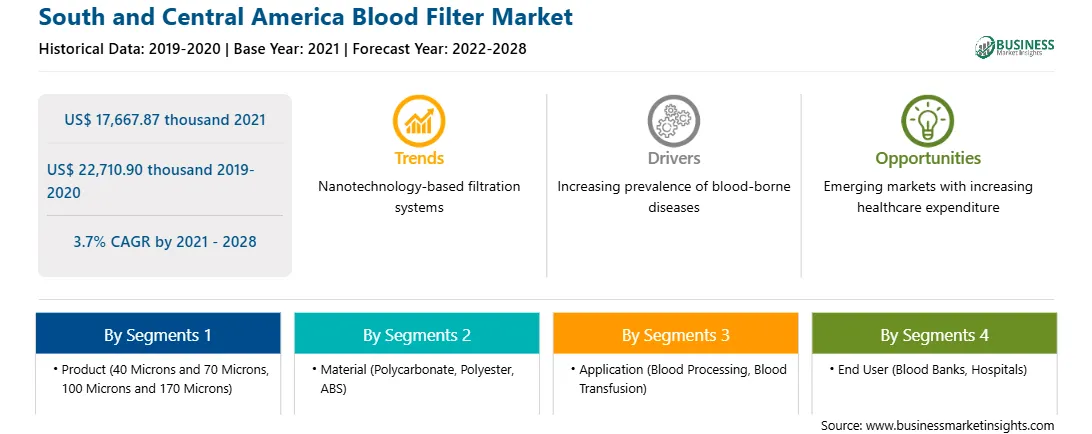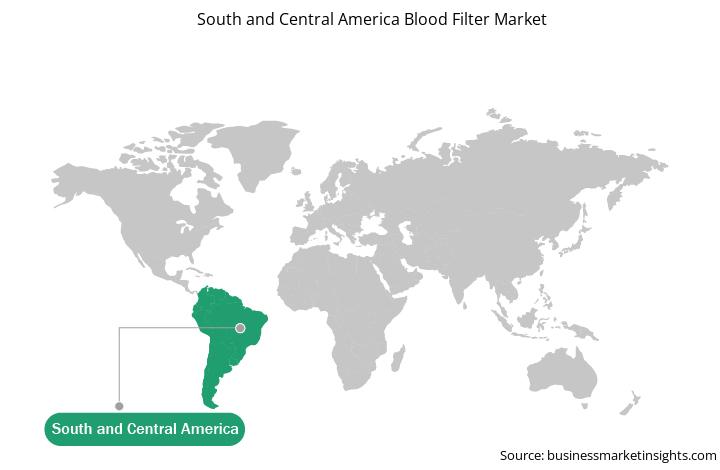Aging population and lifestyle changes are leading to a steady increase in the prevalence of chronic medical conditions. The rapidly growing middle-class population and urbanization are driving the adoption of a sedentary lifestyle. The modernization of facilities reduces physical activities among people, while various personal, professional, and societal factors are adding to their stress levels. Arthritis; cardiovascular diseases, e.g., heart attacks and stroke; breast and colon cancer; diabetes; epilepsy and seizures; obesity; and oral health problems are among the leading chronic diseases reported among elderlies in developed countries. Chronic diseases affect public health, societies, and economies in various countries. Blood filters are widely used in various surgical procedures, such as cardiac surgery and other invasive procedures. Chronic diseases such as cancer, cardiovascular diseases, and renal disorders are the major causes of human death. These conditions are generally treated via surgical procedures, which are associated with a chance of excessive blood loss. Thus, these procedures are followed by the infusion of fresh blood to patients or reinfusion of their own blood. Blood filters are used during the blood infusion or reinfusion processes. Therefore, the South and Central America blood filter market is growing with the rapid increase in the burden of chronic diseases.
In South and Central America, Brazil, Peru, Chile, Ecuador, and Venezuela have reported a large number of COVID-19 cases. Many countries in South America have underdeveloped healthcare infrastructure. For instance, Peru has less than 1000 intensive care unit beds for its 32 million inhabitants. Supply chain disruptions caused due to the congestion of ports and disturbances in other transport means had a substantial impact on the distribution of associated devices in the region. All these factors considerably deterred the growth of the South and Central America blood filter market. Further, with the redirected focus on managing COVID-19 cases, the non-urgent medical procedures were delayed in hospitals in South and Central American countries. Several clinics have postponed or dropped numerous elective surgeries, especially those that are considered non-urgent. This led to reduced demand for blood filters due to the lowered blood transfusion procedures.
Strategic insights for the South and Central America Blood Filter provides data-driven analysis of the industry landscape, including current trends, key players, and regional nuances. These insights offer actionable recommendations, enabling readers to differentiate themselves from competitors by identifying untapped segments or developing unique value propositions. Leveraging data analytics, these insights help industry players anticipate the market shifts, whether investors, manufacturers, or other stakeholders. A future-oriented perspective is essential, helping stakeholders anticipate market shifts and position themselves for long-term success in this dynamic region. Ultimately, effective strategic insights empower readers to make informed decisions that drive profitability and achieve their business objectives within the market.

| Report Attribute | Details |
|---|---|
| Market size in 2021 | US$ 17,667.87 thousand |
| Market Size by 2028 | US$ 22,710.90 thousand |
| Global CAGR (2021 - 2028) | 3.7% |
| Historical Data | 2019-2020 |
| Forecast period | 2022-2028 |
| Segments Covered |
By Product
|
| Regions and Countries Covered | South and Central America
|
| Market leaders and key company profiles |
The geographic scope of the South and Central America Blood Filter refers to the specific areas in which a business operates and competes. Understanding local distinctions, such as diverse consumer preferences (e.g., demand for specific plug types or battery backup durations), varying economic conditions, and regulatory environments, is crucial for tailoring strategies to specific markets. Businesses can expand their reach by identifying underserved areas or adapting their offerings to meet local demands. A clear market focus allows for more effective resource allocation, targeted marketing campaigns, and better positioning against local competitors, ultimately driving growth in those targeted areas.

The South and Central America Blood Filter Market is valued at US$ 17,667.87 thousand in 2021, it is projected to reach US$ 22,710.90 thousand by 2028.
As per our report South and Central America Blood Filter Market, the market size is valued at US$ 17,667.87 thousand in 2021, projecting it to reach US$ 22,710.90 thousand by 2028. This translates to a CAGR of approximately 3.7% during the forecast period.
The South and Central America Blood Filter Market report typically cover these key segments-
The historic period, base year, and forecast period can vary slightly depending on the specific market research report. However, for the South and Central America Blood Filter Market report:
The South and Central America Blood Filter Market is populated by several key players, each contributing to its growth and innovation. Some of the major players include:
The South and Central America Blood Filter Market report is valuable for diverse stakeholders, including:
Essentially, anyone involved in or considering involvement in the South and Central America Blood Filter Market value chain can benefit from the information contained in a comprehensive market report.